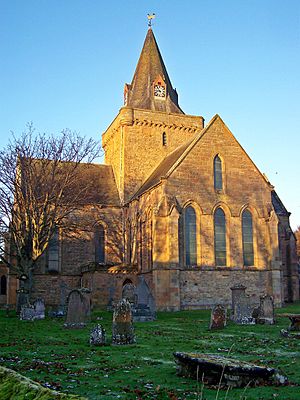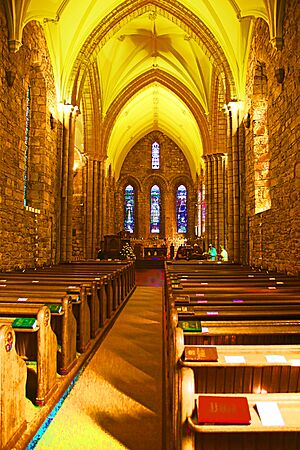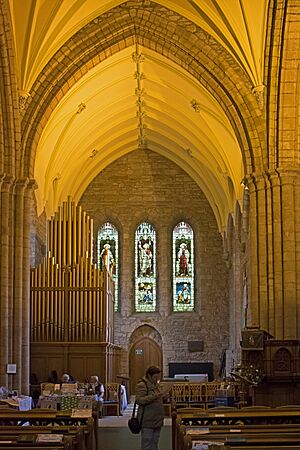Dornoch Cathedral facts for kids
Quick facts for kids Dornoch Cathedral |
|
|---|---|

Dornoch Cathedral
|
|
| Lua error in Module:Location_map at line 420: attempt to index field 'wikibase' (a nil value). | |
| Location | Dornoch |
| Country | Scotland |
| Denomination | Church of Scotland |
| Previous denomination | Roman Catholic |
| History | |
| Founded | 1224 |
| Founder(s) | Gilbert Murray |
| Dedication | St Mary and St Gilbert |
| Architecture | |
| Heritage designation | Category A listed |
| Designated | 18 March 1971 |
| Administration | |
| Parish | Dornoch |
| Presbytery | Sutherland |
Dornoch Cathedral is a church in the small town of Dornoch in the Scottish Highlands. It belongs to the Church of Scotland, which is a Presbyterian church. Even though it's called a "cathedral," it doesn't have a bishop today. The name comes from its history, as it used to be the main church for the Bishop of Caithness. Next to the church is Dornoch Castle, which was once the bishop's palace. Dornoch Cathedral was originally a Catholic cathedral.
Contents
History of Dornoch Cathedral
Building the Cathedral
The cathedral was built in 1224. It was dedicated to its founder, St. Gilbert. This happened during the time of King Alexander II. St. Gilbert was the bishop of Caithness, and he moved the main church for his area to Dornoch. In 1248, William de Moravia, the first Earl of Sutherland, was buried here.
Fires and Rebuilding
In 1570, the Mackays of Strathnaver burned down the cathedral during local fights. It took a long time for the church to be fully repaired. Major renovations happened between 1835 and 1837. These repairs were paid for by Elizabeth, the Countess of Sutherland. She spent about £15,000, which was a huge amount of money back then!
During these renovations, the old medieval nave (the main part of the church where people sit) was taken down. A new, narrower nave was built in its place without the large pillars that were there before.
Changes in Leadership
In the 1600s, Dornoch stopped being the home of the Bishops of Caithness. This was because the Church of Scotland changed its system and no longer had bishops in the same way. However, the church kept the name "cathedral" because of its important history.
Royal Visitors and Modern Changes
In 1866, important guests visited the cathedral. The Prince and Princess of Wales, along with the Duke of Edinburgh, attended a morning service.
Between 1924 and 1926, the inside of the church was changed again. Old plaster was removed to show the stone walls underneath. The area where the main altar used to be was raised. It became a burial place for the Sutherland family, who added large marble memorials there.
The minister of Dornoch Cathedral from 1998 was the Reverend Susan Brown. In 2018, she became the Moderator of the General Assembly of the Church of Scotland. This is a very important role, like being the leader of the Church of Scotland for a year.
Notable Burials
Many important people have been buried at Dornoch Cathedral:
- Adam of Melrose - his body was moved here in 1239.
- William de Moravia, 1st Earl of Sutherland - buried in 1248.
- Saint Gilbert of Dornoch - the person who founded the cathedral.
- Richard de Moravia - buried after he died in the Battle of Embo in 1245.
- George Leveson-Gower, 1st Duke of Sutherland
- Elizabeth Leveson-Gower, Duchess of Sutherland
The Organ
The first organ in Dornoch Cathedral was installed in 1893. It was a gift from Andrew Carnegie, a very rich businessman who gave a lot of money to build libraries and other public buildings. This was the first organ ever installed in the county of Sutherland! In 1909, the organ was made bigger and improved. Andrew Carnegie also helped pay for this upgrade. You can find details about the organ on the National Pipe Organ Register.
Gallery
-
A plaque remembering the 5th Battalion Seaforth Highlanders from World War II.
-
The cemetery next to Dornoch Cathedral.
See also
 | Frances Mary Albrier |
 | Whitney Young |
 | Muhammad Ali |






